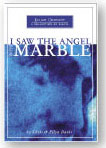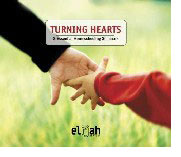
E-journal July 1, 2008 |
The duck did fantastically well in swimming and flying, but he lagged behind his classmates in climbing and running, so focused special attention on those
two subjects. However, his feet became so sore from trying to run and his wings were so bedraggled from trying to climb that by the end of the year he not only failed both those subjects, but made C’s in swimming and flying, which had once been his two best subjects. The point of this silly story about a school for the animals is that modern education sends every child through a program of study that is targeted toward a “generic” child. It expects every student to be able to follow the same course of study in the same sequence, without considering innate aptitudes or individual differences that are crucial to children’s abilities to learn. Schooling does not take into account differing personality types or temperaments. Parents who understand learning differences can be more sympathetic with the frustrations their children face in school and more helpful in finding alternative approaches. The two major learning differences among children have to do with learning styles and learning readiness. Conditions that affect learning Each person has a dominant or preferred mode of receiving information. People also have different ways in which they process input, different innate aptitudes, and different temperaments. These differences in learning modalities can profoundly affect their ability to learn. A Visual learner is one who learns best through visual images, pictures, diagrams, etc. and by watching others do something. Visual learners tend to be print oriented and can learn by reading about a subject. Some visual learners are strictly Print learners. Auditory learners do better with lectures, songs, stories and other oral material. Kinesthetic learners favor interacting with what they are learning by doing and touching. Most young children are kinesthetic learners, but oftentimes boys will continue to need “hands-on” materials even when they are older. A child will give you clues as to which kind of a learner he is not only in his activities but also in the words he uses to express himself. If a child observes
and remembers details, likes beautiful things and bright illustrations, and tends to express himself with phrases such as “Look at this!” or “I see what you mean,” that child is probably a visual learner. If the child often sings to himself or makes up songs, can remember what people say, and uses expressions like, “Listen to this!” or “I hear what you’re saying” to mean he understands, he may be an auditory learner. The child who likes to touch everything, take things apart, and uses expressions like, “I get it” is most likely a kinesthetic learner. Another component of learning is what scientists call The Seven Intelligences. Different people have various innate abilities that make certain studies easier for them. This innate aptitude may be musical, artistic, logicalmathematical, linguistic, bodily-kinesthetic, interpersonal, or intra-personal. Visual-Spacial Intelligence is the ability to understand the relationships of images and figures in space. Musical-Rhythmic Intelligence is the ability to
hear tone and pitch and to sense rhythm. Bodily-Kinesthetic Intelligence is the ability to move with grace and strength. Interpersonal Intelligence is the ability to work with other people and lead them. Intra-personal Intelligence is the ability to understand one’s own emotions, motivations, and goals. In addition, a child’s temperament and his spiritual gifting can have a powerful influence on his ability to learn. Profound differences in people’s personalities cause them to be more receptive to certain learning environments and methods. Determining your child’s learning preferences can be important because traditional teaching methods and materials favor the serious and deliberate temperaments, visual and auditory learners, left-brained thinkers, and linguistic and logicalmathematical intelligences. Learning readiness 1] Many children suffer needless physical, emotional, and mental stress because they are placed in academic settings before their vision, hearing, nervous system, reasoning abilities, and muscular coordination are developed enough to complete conventional schooling tasks, and 2] Children are often taught academic skills before they have enough life experiences and background knowledge to grasp the concepts involved. Dr. Moore and his wife, Dorothy, have since become two of America’s leading advocates of home education. They have written many books encouraging parents to delay formal education until children are mentally, physically and emotionally ready. A comfortable learning environment Many children are sensitive to lighting, to room temperature, to visual distractions such as clutter, to auditory distractions such as background noise, and to whether the seating is comfortable. Until next time....
The first half of 100 Top Picks covers information that will help you decide your child's learning styles, help you decide what your "Philosophy of Education" is, and help you figure what to teach when. The second half has reviews for all 100 of the top picks. You will gain a lot of insight into what curriculum is available by reading these reviews. She even tosses some extra "Picks" here and there that would've made the list if her books title was "200 Top Picks".
With over 4,000 copies sold in just a few months, I Saw the Angel in the Marble is becoming a home schooling best seller! This book represents the best of 15 years of Elijah Company articles. Find our more HERE>>
|
My friend Susan is a home schooling Mom and she is very concerned about her children's health. Her son, Liam is allergic to almost every chemical known to man, so Susan has to be very, very careful what she allows him to play with. When he gets together with other children and they play with Play Doh, Liam can't play. The dyes and chemicals in the dough can not only make him very sick, they might kill him. Rhea's Entrepreneur Days 1) Create additional income or replace current monthly income 2) Reduce debt to manage monthly bills 3) Work for yourself instead of for someone else 4) Train your children to own their own business so they can become financially free
If you missed one of our From Home School to Home Business Conferences, you missed a great time.People who have attended tell us that it changed their lives—not only in the area of home schooling, but also in the area of creating their own sources of home income.This set is huge and filled with useful and encouraging information about how to be successful at home schooling and at home business! Find out more about this life-changing set of CDs HERE>> Building the Business of Your Dreams (8 CD Set) I've had requests for just the business portion of the From Home School to Home Business Seminar, so have developed a set of the business CDs from that set. It contains 8 CDs and includes sessions on The Entrepreneurial Mind, Multiple Streams of Home Income, Discovering Your Ideal Life and Ideal Business (2 CDs) , Developing a Business Plan (2 CDs), and The Importance of Business Relationships. Plus, there is a very important and insightful interview on Redeeming the Marketplace. Find out about this life-changing set of CDs HERE>> SALE PRODUCTS!
Limited Quantities
1. What kind of school experience does your child have? Students who are left-brained do very well in traditional classrooms. They are good at spelling and grammar and have neat handwriting. They are logical and excel at algebra, though they may struggle with geometry. Students who are right-brained often struggle in a traditional classroom setting. They can be easily distracted and are often told they have ADD or are “late bloomers.” They are often poor spellers and have sloppy hand-writing. They excel at geometry but struggle with algebra. They excel at the visual arts and usually show talent in drawing and sculpting.
2. Does your child prefer working in groups or working alone. Students who are left-brained enjoy working on group projects, but right-brained people usually prefer working on their own.
3. How does your child remember things? Left-brainers tend to make written lists. They will instinctively begin to take notes. Right-brainers rely on their visual memory and “see”what they want to remember in their mind’s eye, feeling like writing them down distracts them from remembering.
4. How does your child respond to ideas and challenges? Left-brained people can be uncomfortable with change and prefer to stick to routine. They like things that are familiar and predictable. Right-brained people welcome change.
5. Is your child good at following directions? Left-brainers are good at following directions. Right-brainers are not, and often prefer to figure things out for themselves. When assembling a project, left-brained people will read the instruction sheet before starting the assembling.
6. How does your child feel about rules? Left-brained children enjoy making and following rules and like to "run" things and can tend to be bossy. Right-brained children often dislike rules and prefer activities where they can make up their own guidelines.
7. Is your child creative? Left-brainersr tend not to be imaginative. Right-brainers are more likely to be highly imaginative and creative.
8. Do your child remember names or faces? Left-brainers are better at remembering names, while right-brainers are better at remembering faces.
9. Is your child hypersensitive to touch or smell? If so, he or she is probably right-brained. Right-brained people are often bothered by things like tags in clothing, tight shoelaces, coarse-textured fabrics and smells in their environment.
Any article appearing on this website may be copied or forwarded electronically provided that proper credit is given and that the article is not substantively modified.
No article may appear in whole or in part in a publication sold for profit or as part of any commercial endeavor without the written consent of Home School Marketplace. Any reprint must include an acknowledgement of where it came from and the sentence "Sign up for the Home School Marketplace newsletter at www.homeschoolmarketplace.com." Be sure to sign up for our ejournal!
Sign up below.
|

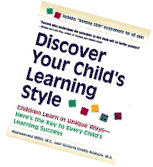 Discover Your Child's Learning Style
Discover Your Child's Learning Style Discover Your Children's Gifts
Discover Your Children's Gifts Dreamers, Discoverers and Dynamos.
Dreamers, Discoverers and Dynamos.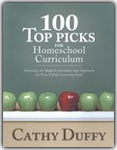
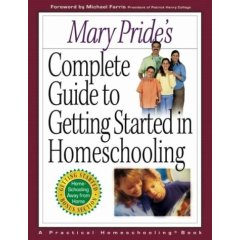 Mary Pride's Complete Guide to Getting Started in Homeschooling.
Mary Pride's Complete Guide to Getting Started in Homeschooling. 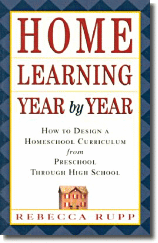 Home Learning Year by Year: How to Design a Homeschool Curriculum from Preschool Through High School
Home Learning Year by Year: How to Design a Homeschool Curriculum from Preschool Through High School